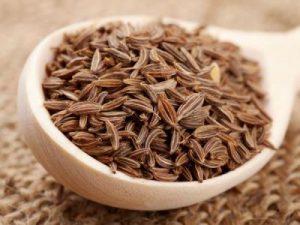Cumin (Cuminum cyminum) Tops pounds
 Indian kim (Roman cumin, PROMENADE) gives the food a mystic and refined taste, so characteristic of Indian cuisine.
Indian kim (Roman cumin, PROMENADE) gives the food a mystic and refined taste, so characteristic of Indian cuisine.
Did you know that just a teaspoon of cumin helps you lose excess weight. This is great news for all those who want to reach and maintain a slim figure.
Recent research has shown that cumin who historically used as a spice and medicine, can be a great ally in the fight against excess weight.
Research conducted at the Iranian Medical University Shahid Sadugi showed unbelievable results. Only teaspoon cumin day helps with weight loss, reduces the percentage of body fat and lowers cholesterol levels.
The study included 88 women who were divided into two groups. Both groups consumed during the three months 500 calories less a day, or a group of women consumed daily and yogurt mixed with a teaspoon of cumin.
How cumin is given such amazing results? This spice is rich in phytosterols, substances that are known to reduce the absorption of cholesterol in the body.
In addition as a supplement yogurt, cumin can be consumed as salad dressing, mayonnaise or as a supplement to add sauces.
Affects:
Improving welding
Reducing gases and flatulence
Neutralizing excess acid
the normal secretion of digestive juices
Removing abdominal cramps
Neutral the movement of food through the bowel
problems with urinary tract stones
Due to its exquisite aroma seed Djire favorite spice in Indian, Mexican, Cuban, Chinese-west, north-African and Middle-Eastern cuisine. The taste and smell of Indian cumin stem from the abundance of essential oils, especially cumin aldehyde in raw seeds and pyrazine resulting from its roasting or baking.
Indian cumin is required ingredient of curry, some kind of Dutch cheeses and traditional French breads and Brazilian cuisine. Featured spice blends such as garam masala, achiote, adobos, sofrito, curry, etc. bahaarat. To a large extent, contain and cumin.
Cumin is an excellent seasoning for vegetables and legumes because it emphasizes the natural sweetness of the ingredients and neutralize their harshness and the tendency towards the creation of gas in the intestines. Therefore widely used in ancient Greece and ancient Rome, where it was customary at the table holding a tray with Indian cumin, as it is today holding pepper. This custom is to this day held in Morocco.
Djire homeland is considered Persija. Today, the most cultivated in India, Sri Lanka, Syria, Pakistan and Turkey, and somewhat less in Iran, Uzbekistan, Tajikistan, Morocco, Egypt, Mexico and Chile.